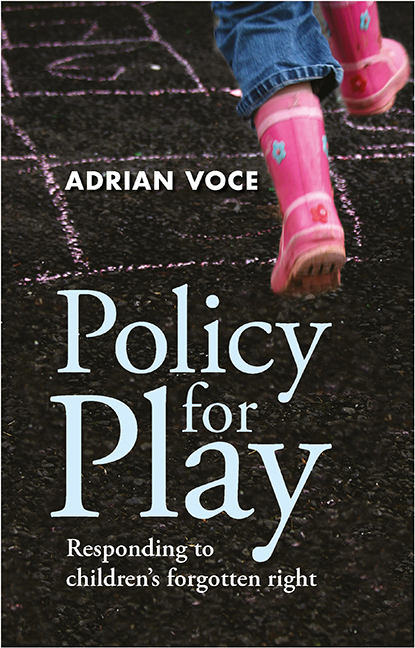Book contents
- Frontmatter
- Dedication
- Contents
- Who’s who
- About the author
- Preface
- Foreword
- Prologue
- Introduction ‘To respect, protect and fulfil’
- one ‘To play and to dream’ • Restoring play to the heart of the campaign for children’s rights
- two ‘For a change’ • Finding the evidence for play policy
- three ‘Advocates for play’ • Playwork’s place at the heart of the play movement
- four ‘New opportunities’ • Lottery funding and the beginnings of public play policy
- five ‘A vital and vibrant city’ • How devolved government in London set a benchmark for play policy
- six ‘Making the case’ • The call for a national play strategy
- seven ‘Things to do, places to go?’ • How play was overlooked by children’s services reform
- eight ‘Getting serious’ • The national play review
- nine ‘Lottery millions’ • The Children’s Play Initiative
- ten ‘Dirt is good’ • The Play England project
- eleven ‘The best place in the world’ • The Play Strategy for England
- twelve ‘Playbuilders’ • Breaking the mould of the public playground
- thirteen ‘Everyday adventures?’ • Austerity brings an end to play policy in England
- fourteen ‘Skylarks and canaries’ • The legacy of the Play Strategy
- fifteen ‘Children now’ • Responding to children’s right to play: conclusions and recommendations
- Epilogue
- References
- Index
Introduction - ‘To respect, protect and fulfil’
Published online by Cambridge University Press: 08 March 2022
- Frontmatter
- Dedication
- Contents
- Who’s who
- About the author
- Preface
- Foreword
- Prologue
- Introduction ‘To respect, protect and fulfil’
- one ‘To play and to dream’ • Restoring play to the heart of the campaign for children’s rights
- two ‘For a change’ • Finding the evidence for play policy
- three ‘Advocates for play’ • Playwork’s place at the heart of the play movement
- four ‘New opportunities’ • Lottery funding and the beginnings of public play policy
- five ‘A vital and vibrant city’ • How devolved government in London set a benchmark for play policy
- six ‘Making the case’ • The call for a national play strategy
- seven ‘Things to do, places to go?’ • How play was overlooked by children’s services reform
- eight ‘Getting serious’ • The national play review
- nine ‘Lottery millions’ • The Children’s Play Initiative
- ten ‘Dirt is good’ • The Play England project
- eleven ‘The best place in the world’ • The Play Strategy for England
- twelve ‘Playbuilders’ • Breaking the mould of the public playground
- thirteen ‘Everyday adventures?’ • Austerity brings an end to play policy in England
- fourteen ‘Skylarks and canaries’ • The legacy of the Play Strategy
- fifteen ‘Children now’ • Responding to children’s right to play: conclusions and recommendations
- Epilogue
- References
- Index
Summary
One weekday morning in the summer of 2004, over a hurried breakfast before joining the daily rush of London’s commuter throng, along with an estimated audience of around nine million other radio listeners I tuned in to the Today programme on the BBC.
The Shadow Chancellor, Oliver Letwin MP (2004) of the Conservative Party, was being interviewed about one of his favourite themes in the run up to the following year’s general election. This was how a new Tory administration would reduce taxes, not by cutting front line public services, but by reducing ‘wasteful’ expenditure on the ‘fat bureaucracy’ of government. Searching for an example to best illustrate the Labour government’s alleged profligacy, he remarked that among the ‘huge number of quangos’ employing ‘armies of bureaucrats’ the government ‘even has a council for children’s play’.
As the chair (shortly to become director) of the very same Children’s Play Council (CPC), this sideswipe from the would-be Chancellor of the Exchequer was not what I was accustomed to hearing over breakfast. It was not just the dismissive nature of the remark that caught me off guard. The mere mention of children’s play on the Today programme, let alone in a discussion of economic policy by a senior politician, was in itself enough of a surprise to cause our then-director, Tim Gill (2008a), to later confess to nearly choking on his toast.
CPC was not, in fact, a government agency or ‘quango’, but a membership body of voluntary and public play organisations hosted by the National Children’s Bureau (NCB), a registered charity. Although we did hold a small government contract, we were also funded by various charitable trusts and membership fees. Our role was very much that of an independent advocate for children’s right to play. Researching and disseminating evidence about play and play provision, CPC’s main aim was to build a consensus about how society in general, and government in particular, should respond to what we knew were increasing barriers to children’s natural enjoyment of this fundamentally important part of their lives.
After checking with colleagues that we had no particular engagement with Letwin’s office, let alone of the kind that might invoke such disapproval, we quickly came to realise that we had been singled out, not for anything we had said or done, but for what we represented to a particular school of thought.
- Type
- Chapter
- Information
- Policy for PlayResponding to Children's Forgotten Right, pp. 1 - 12Publisher: Bristol University PressPrint publication year: 2015

